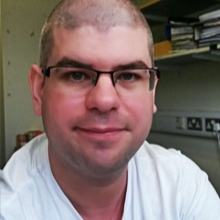David Grainger wins the 2016 Fleming Prize
18 March 2016

Today at the Annual Conference, Dr David Grainger from the University of Birmingham will be awarded the Society’s Fleming Prize, in recognition of his innovative studies in the field of bacterial chromosome biology.
When did you first become aware of science?
I would say it was when I was a kid. I guess I must have been quite into science, although I don’t know if my parents used to buy me lots of science books because I liked the subject, or whether I liked the subject because they were buying me books! I’ve still got them – children’s science encyclopaedias, that sort of thing.
Does the science in them hold up?
I was looking at them recently, while I was searching for some books for my children. What I thought was interesting is that while there’s lots about space and physics, there’s not much about genetics or DNA, whereas now I’m sure there would be.
You’ve followed a slightly different career path to many academics as you first trained to be a teacher. How did that come about?
I graduated in 1999 with little idea of what I wanted to do. When I started as an undergraduate it seemed like a bit of a chore to be honest – I only became really inspired about halfway through, and even then I didn’t enjoy the practical aspect as much as I thought I would. At this point I was convinced I didn’t want to be a scientist, so I applied for teaching almost by default, more because I wanted to do something science-related rather than teach.
Ultimately, I realised teaching wasn’t for me, so I emailed some people [at the University of] Birmingham and asked if I could go back and do a PhD. I still finished my teaching course, which has proved useful as I learnt a lot of skills I use now – how to present and how to get your message across. I also haven’t had to do any university teaching qualifications, which is a bonus.
How would you describe your work?
Everything we do centres around the way that proteins interact with DNA and the consequences of those interactions. In retrospect this has been a really useful way to move into different areas. Protein–DNA interactions are at the heart of so many processes: DNA replication, transcription control, and whether virulence is switched on or off, for example.
Compared to our other prize winners, your career is relatively young. How has genetics changed during your time as an academic?
When I started as a PhD student there was the view that we understood all the basics of gene regulation in bacteria, and it was all well defined in the textbooks. As we got into genomics-based research, moving from microarrays to genome and transcriptome sequencing, it became quickly clear that all the previous models were too basic and everything is far more complicated than had been expected. To progress, we’re going to need the input of people with different sets of skills to handle these massive datasets.
What’s surprised you about your work?
How quickly the technology’s changed, particularly in the last 10 years. It’s unbelievable, and it’s a real challenge to keep up.
As we move further into in silico analysis, is there still a place for classical genetics?
Yes! Using a lot of biochemical and genetic approaches might only let you study one protein, gene, or interaction, but the information provided can be invaluable. These are often very complicated techniques and if a generation skips learning them it might be a struggle to get these expertise back into routine use. I think it’s important that we’re able to use genomic and computational approaches to identify things of interest but then drill down to the molecular level to work out what’s happening.
What are you going to be talking about in your lecture today?
I’m going to talk about how bacterial chromosomes are much more complicated than we’d ever anticipated. I’ll start with a view of genes and their regulation rooted in the 1960s, the classic models like the lac operon, and show that these models can explain simple regulatory phenomenon. I’ll then move into the genomic era and show that more and more observations couldn’t be explained by these models. I’ll also touch on some of our recent work that has helped us understand the evolution of chromosomes and gene regulation.
What does winning this prize mean to you?
I guess everybody likes a pat on the back! It feels good to have made a contribution that people think is reasonably important.
Image: University of Birmingham..
